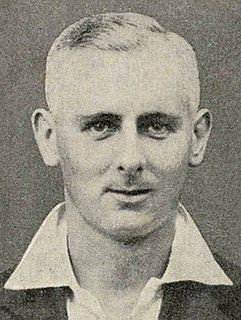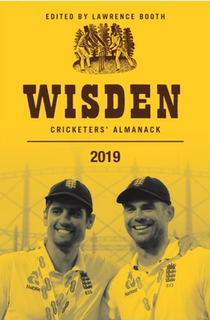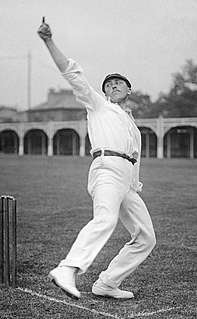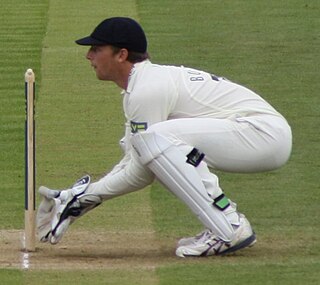
Sir Curtly Elconn Lynwall Ambrose KCN is an Antiguan former cricketer who played 98 Test matches for the West Indies. Widely acknowledged as one of the greatest fast bowlers of all time, he took 405 Test wickets at an average of 20.99 and topped the ICC Player Rankings for much of his career to be rated the best bowler in the world. His great height—he is 6 feet 7 inches (2.01 m) tall—allowed him to make the ball bounce unusually high after he delivered it; allied to his pace and accuracy, it made him a very difficult bowler for batsmen to face. A man of few words during his career, he was notoriously reluctant to speak to journalists. He was chosen as one of the Wisden Cricketers of the Year in 1992; after he retired he was entered into the International Cricket Council Hall of Fame and selected as one of West Indies all-time XI by a panel of experts.

Sir Leonard Hutton was an English cricketer. He played as an opening batsman for Yorkshire County Cricket Club from 1934 to 1955 and for England in 79 Test matches between 1937 and 1955. Wisden Cricketers' Almanack described him as "one of the greatest batsmen in the history of cricket". He set a record in 1938 for the highest individual innings in a Test match in only his sixth Test appearance, scoring 364 runs against Australia, a milestone that stood for nearly 20 years. Following the Second World War, he was the mainstay of England's batting. In 1952, he became the first professional cricketer of the 20th Century to captain England in Tests; under his captaincy England won the Ashes the following year for the first time in 19 years.

Walter Reginald Hammond was an English first-class cricketer who played for Gloucestershire in a career that lasted from 1920 to 1951. Beginning as a professional, he later became an amateur and was appointed captain of England. Primarily a middle-order batsman, Wisden Cricketers' Almanack described him in his obituary as one of the four best batsmen in the history of cricket. He was considered to be the best English batsman of the 1930s by commentators and those with whom he played; they also said that he was one of the best slip fielders ever. Hammond was an effective fast-medium pace bowler and contemporaries believed that if he had been less reluctant to bowl, he could have achieved even more with the ball than he did.
The Wisden Cricketers of the Year are cricketers selected for the honour by the annual publication Wisden Cricketers' Almanack, based primarily on their "influence on the previous English season". The award began in 1889 with the naming of "Six Great Bowlers of the Year", and continued with the naming of "Nine Great Batsmen of the Year" in 1890 and "Five Great Wicket-Keepers" in 1891.

Hedley Verity was a professional cricketer who played for Yorkshire and England between 1930 and 1939. A slow left-arm orthodox bowler, he took 1,956 wickets in first-class cricket at an average of 14.90 and 144 wickets in 40 Tests at an average of 24.37. Named as one of the Wisden Cricketers of the Year in 1932, he is regarded as one of the most effective slow left-arm bowlers to have played cricket. Never someone who spun the ball sharply, he achieved success through the accuracy of his bowling. On pitches which made batting difficult, particularly ones affected by rain, he could be almost impossible to bat against.

The Wisden Leading Cricketer in the World is an annual cricket award selected by Wisden Cricketers' Almanack. It was established in 2004, to select the best cricketer based upon their performances anywhere in the world in the previous calendar year. A notional list of previous winners, spanning from 1900 to 2002, was published in the 2007 edition of Wisden.

Wisden Cricketers' Almanack, or simply Wisden, colloquially the Bible of Cricket, is a cricket reference book published annually in the United Kingdom. The description "bible of cricket" was first used in the 1930s by Alec Waugh in a review for the London Mercury. In October 2013, an all-time Test World XI was announced to mark the 150th anniversary of Wisden Cricketers' Almanack.

Wilfred Rhodes was an English professional cricketer who played 58 Test matches for England between 1899 and 1930. In Tests, Rhodes took 127 wickets and scored 2,325 runs, becoming the first Englishman to complete the double of 1,000 runs and 100 wickets in Test matches. He holds the world records both for the most appearances made in first-class cricket, and for the most wickets taken (4,204). He completed the double of 1,000 runs and 100 wickets in an English cricket season a record 16 times. Rhodes played for Yorkshire and England into his fifties, and in his final Test in 1930 was, at 52 years and 165 days, the oldest player who has appeared in a Test match.

Hugh Trumble was an Australian cricketer who played 32 Test matches as a bowling all-rounder between 1890 and 1904. He captained the Australian team in two Tests, winning both. Trumble took 141 wickets in Test cricket—a world record at the time of his retirement—at an average of 21.78 runs per wicket. He is one of only four bowlers to twice take a hat-trick in Test cricket. Observers in Trumble's day, including the authoritative Wisden Cricketers' Almanack, regarded him as ranking among the great Australian bowlers of the Golden Age of cricket. He was named as one of the Wisden Cricketers of the Year in 1897 and the Australian Cricket Hall of Fame, established in 1996, inducted him in 2004.

George Henry Stevens "Harry" Trott was an Australian cricketer who played 24 Test matches as an all-rounder between 1888 and 1898. Although Trott was a versatile batsman, spin bowler and outstanding fielder, "it is as a captain that he is best remembered, an understanding judge of human nature". After a period of some instability and ill discipline in Australian cricket, he was the first in a succession of assertive Australian captains that included Joe Darling, Monty Noble and Clem Hill, who restored the prestige of the Test team. Respected by teammates and opponents alike for his cricketing judgement, Trott was quick to pick up a weakness in opponents. A right-handed batsman, he was known for his sound defence and vigorous hitting. His slow leg-spin bowling was often able to deceive batsmen through subtle variations of pace and flight, but allowed opposition batsmen to score quickly.
The Wisden Cricketers of the Century are five cricketers who were judged to be the most prominent players of the 20th century, as selected by a 100-member panel of cricket experts appointed by Wisden Cricketers' Almanack in 2000. The 97 men and three women on the panel were each given five votes with which to select the list. In order of votes, the five Wisden Cricketers of the Century are:

Colin Leslie McCool was an Australian cricketer who played in 14 Test matches between 1946 and 1950. McCool, born in Paddington, New South Wales, was an all-rounder who bowled leg spin and googlies with a round arm action and as a lower order batsman was regarded as effective square of the wicket and against spin bowling. He made his Test début against New Zealand in 1946, taking a wicket with his second delivery. He was part of Donald Bradman's Invincibles team that toured England in 1948 but injury saw him miss selection in any of the Test matches.
Brian Lee Irvine is a former cricketer who played four Tests for South Africa in 1969–70 in the last Test series played by South Africa before official sporting links were broken over the apartheid policy.

Douglas Thomas Ring was an Australian cricketer who played for Victoria and for Australia in 13 Test matches between 1948 and 1953. In 129 first-class cricket matches, he took 426 wickets bowling leg spin, and he had a top score of 145 runs, which was the only century of his career.
1953 was the 54th season of County Championship cricket in England. There was a tight Test series between England and Australia that was settled, after four drawn matches, in the final Test at The Oval, where England won to reclaim The Ashes for the first time since the Bodyline series of 1932–33. The County Championship was won by Surrey for the second consecutive season.
1909 was the 20th season of County Championship cricket in England and featured a Test series between England and Australia. Kent won the championship and Australia, captained by Monty Noble, won the Test series.
The Australia national cricket team toured South Africa from February to April 1994 and played a three-match Test series against the South Africa national cricket team. The tour was Australia's first to South Africa since the end of the apartheid regime which had led to a sporting boycott of the country. Australia's most recent tour to South Africa had taken place in 1969–70 and a planned tour of the country in 1971–72 had been cancelled after the International Cricket Conference had imposed a moratorium on tours in 1970 and following the player withdrawals and protests which accompanied the tour of Australia by the South African rugby union side during 1971. The Australian Cricket Board postponed their proposed tour of Sri Lanka in order to schedule the series, paying A$50,000 compensation to the Board of Control for Cricket in Sri Lanka.

The Young Wisden Cricketer of the Year is a cricketer selected for the honour by the annual publication Wisden Cricketers' Almanack. The decision is based upon "his or her performances in school's cricket, as reported in Wisden". Wisden has included details of schools cricket as far back as its second edition in 1865, when it carried an account of the match between Eton College and Harrow School. In 1918 and 1919, as no first-class cricket was being played due to the First World War, the five Wisden Cricketers of the Year were chosen from public schools. The first Young Wisden Cricketer of the Year was named in 2008, in the 144th edition of Wisden Cricketers' Almanack, in an effort to "help raise the profile of schools cricket, especially at state schools." The first winner was Jonny Bairstow of St Peter's School, York.
Kent County Cricket Club's 1909 season was the twentieth season in which the County competed in the County Championship. Kent played 30 first-class cricket matches during the season, losing only two matches overall, and won their second Championship title. They finished clearly ahead of second place Lancashire in the 1909 County Championship with the previous years winners Yorkshire in third place.
The Wisden Leading Woman Cricketer in the World is an annual cricket award selected by the editor of Wisden Cricketers' Almanack. It was established in 2015, to select the best female cricketer based upon their performances anywhere in the world in the previous calendar year. Prior to the establishment of this dedicated award, women were also eligible for inclusion in Wisden's Cricketers of the Year; two were selected, England's Claire Taylor in 2009 and Charlotte Edwards in 2014.












